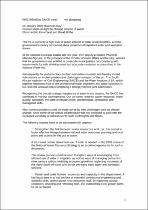 ResearchSpace
ResearchSpace
Franchising of water services: a viable business format that can be used to improve the cost and reliability of water services at schools and in poor communities
JavaScript is disabled for your browser. Some features of this site may not work without it.
- ResearchSpace
- →
- Research Publications/Outputs
- →
- Conference Publications
- →
- View Item
| dc.contributor.author |
Ive, O

|
|
| dc.contributor.author |
Wall, K

|
|
| dc.contributor.author |
Bhagwan, J

|
|
| dc.date.accessioned | 2012-04-05T09:23:44Z | |
| dc.date.available | 2012-04-05T09:23:44Z | |
| dc.date.issued | 2011-10 | |
| dc.identifier.citation | Ive, O, Wall, K and Bhagwan, J. Franchising of water services: a viable business format that can be used to improve the cost and reliability of water services at schools and in poor communities. Water and Health: Where Science Meets Policy, Chapel Hill, North Carolina, USA, 3-7 October 2011 | en_US |
| dc.identifier.uri | http://hdl.handle.net/10204/5726 | |
| dc.description | Water and Health: Where Science Meets Policy, Chapel Hill, North Carolina, USA, 3-7 October 2011 | en_US |
| dc.description.abstract | The focus by authorities on the roll-out of new water and sanitation infrastructure for providing services for the previously unserved has often resulted in a reduced focus on maintaining the existing infrastructure and services. When working with previously unserved and poor communities, the operation and maintenance of the water services infrastructure offers a sustainable work opportunity for local people. Having observed the difficulties experienced by small operating enterprises in these communities, it was apparent that most of these small businesses do not survive beyond their initial contracts. Studies were then undertaken to investigate the small business sector to identify ideas that could be borrowed from business for application for the provision of public services. The franchising model was identified, studied and piloted with the intention of evolving the basic franchise model to one which could assist locally based small business to provide improved water services to their local communities. It was found that in addition to the direct socio-economic benefits of job creation and local economic development, the model could offer many operational benefits for the authorities, including improved incentives as well as benefits relating to cost, quality and regulation. | en_US |
| dc.language.iso | en | en_US |
| dc.publisher | UNC | en_US |
| dc.relation.ispartofseries | Workflow;8335 | |
| dc.subject | Water services franchising | en_US |
| dc.subject | Water infrastructure | en_US |
| dc.subject | Water services | en_US |
| dc.title | Franchising of water services: a viable business format that can be used to improve the cost and reliability of water services at schools and in poor communities | en_US |
| dc.type | Conference Presentation | en_US |
| dc.identifier.apacitation | Ive, O., Wall, K., & Bhagwan, J. (2011). Franchising of water services: a viable business format that can be used to improve the cost and reliability of water services at schools and in poor communities. UNC. http://hdl.handle.net/10204/5726 | en_ZA |
| dc.identifier.chicagocitation | Ive, O, K Wall, and J Bhagwan. "Franchising of water services: a viable business format that can be used to improve the cost and reliability of water services at schools and in poor communities." (2011): http://hdl.handle.net/10204/5726 | en_ZA |
| dc.identifier.vancouvercitation | Ive O, Wall K, Bhagwan J, Franchising of water services: a viable business format that can be used to improve the cost and reliability of water services at schools and in poor communities; UNC; 2011. http://hdl.handle.net/10204/5726 . | en_ZA |
| dc.identifier.ris | TY - Conference Presentation AU - Ive, O AU - Wall, K AU - Bhagwan, J AB - The focus by authorities on the roll-out of new water and sanitation infrastructure for providing services for the previously unserved has often resulted in a reduced focus on maintaining the existing infrastructure and services. When working with previously unserved and poor communities, the operation and maintenance of the water services infrastructure offers a sustainable work opportunity for local people. Having observed the difficulties experienced by small operating enterprises in these communities, it was apparent that most of these small businesses do not survive beyond their initial contracts. Studies were then undertaken to investigate the small business sector to identify ideas that could be borrowed from business for application for the provision of public services. The franchising model was identified, studied and piloted with the intention of evolving the basic franchise model to one which could assist locally based small business to provide improved water services to their local communities. It was found that in addition to the direct socio-economic benefits of job creation and local economic development, the model could offer many operational benefits for the authorities, including improved incentives as well as benefits relating to cost, quality and regulation. DA - 2011-10 DB - ResearchSpace DP - CSIR KW - Water services franchising KW - Water infrastructure KW - Water services LK - https://researchspace.csir.co.za PY - 2011 T1 - Franchising of water services: a viable business format that can be used to improve the cost and reliability of water services at schools and in poor communities TI - Franchising of water services: a viable business format that can be used to improve the cost and reliability of water services at schools and in poor communities UR - http://hdl.handle.net/10204/5726 ER - | en_ZA |








